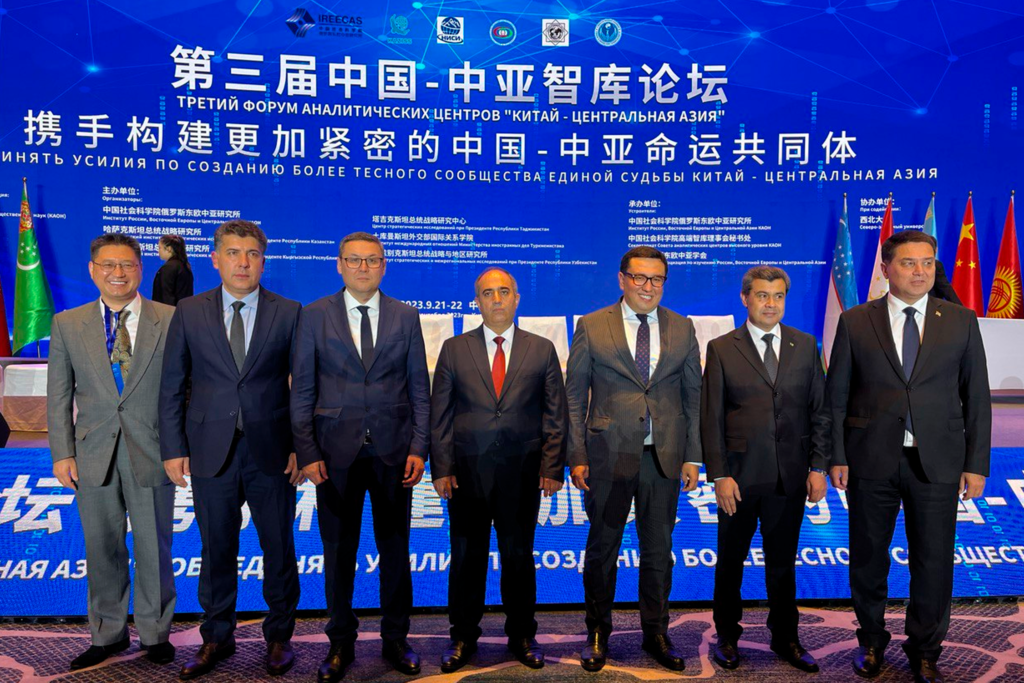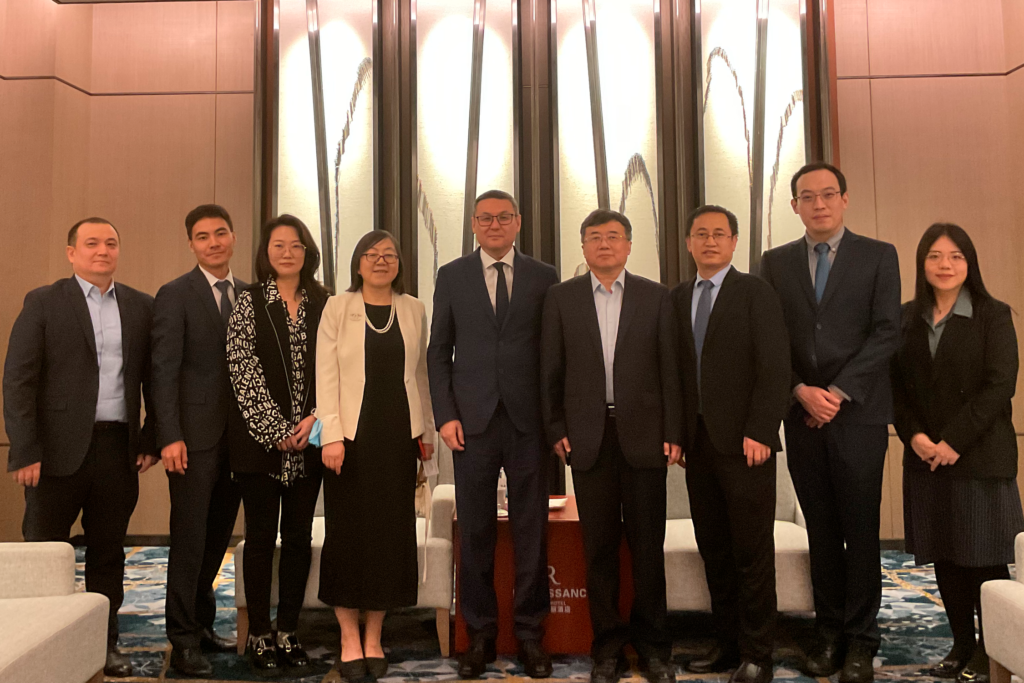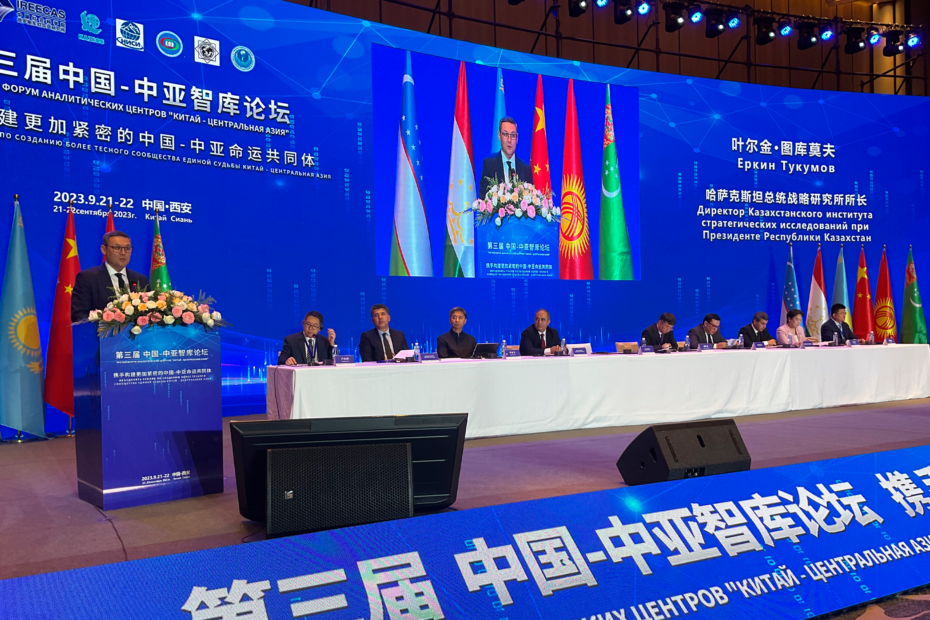On September 21, the third Central Asia-China Think Tanks Forum started its work in Xi’an. Leading think tanks from Central Asia represented the region at the forum, including KazISS under the President of Kazakhstan, the Institute for Strategic and Interregional Studies under the President of Uzbekistan, the National Institute for Strategic Studies under the President of the Kyrgyz Republic, the Center for Strategic Research under the President of Tajikistan, and the Institute of International Relations of Turkmenistan’s Ministry of Foreign Affairs.
China was represented by the Institute of Russian, Eastern European, and Central Asian Studies of the Chinese Academy of Social Sciences, and the Europe and Asia Social Development Institute of the Development Research Center of China’s State Council.
In his speech dedicated to Kazakhstan’s vision of cooperation in the Central Asia-China format, KazISS Director Y. Tukumov drew attention to the issues of interfacing transportation routes, digital development of the region, as well as the expansion of investment attractiveness. Tukumov also outlined the issues of interfacing transportation routes, digital development of the region, as well as the expansion of investment attractiveness.
Tukumov highlighted a 26% increase in cargo transportation to 13.7 million tons between Kazakhstan and China in the first half of this year, mentioning a 37% growth in Kazakhstan’s cargo exports to 8.3 million tons. He noted the significance of transforming transport corridors into fully functional economic routes. Otherwise, he warned, the economy of Kazakhstan and the entire region would remain at an average income level. “Connecting transport routes will open up neighboring markets to small and medium-sized enterprises (SMEs), facilitating trade and creating job opportunities,” he stressed.
Head of KazISS also outlined the need to strengthen cooperation in the field of digitalization: “The financial technology market in Kazakhstan is one of the fastest growing in the country and the largest in CA. One of the main trends in the fintech market in Kazakhstan is the growth of digital payments and e-commerce. The overwhelming majority of the population – 78% makes digital payments. In this direction, it seems advisable to expand technology transfer between the countries of the region and form a Central Asian market of digital technologies. It is important to provide full expert-analytical support to joint projects, which can involve Central Asian institutes of strategic and economic research,” he said.
In the field of investment attraction, Y. Tukumov emphasized that “despite the fact that the global volume of foreign direct investment last year fell by 12.4%, in Kazakhstan, on the contrary, the net inflow of investment in 2022 increased by 83.1%, reaching 6.1 billion dollars”. According to him, in expanding economic cooperation between CA countries and China, ensuring transparency of joint investment projects is of particular importance. This will allow both to receive public support and attract local small and medium-sized businesses to work together.
On the margins of the forum, Director of KazISS also held a number of bilateral meetings. Thus, at the meeting with Sun Zhuangzhi, Director of the Institute of Russia, Eastern Europe and Central Asia, Tukumov noted that Kazakhstan has always been a leader in the field of investment projects. Also he noted that Kazakhstan always remains committed to open expert dialogue on all topical interstate issues:
“KazISS attaches special importance to the dialogue with international think tanks, and Chinese institutions occupy special place. Here, in Xi’an, we have met with representatives of many think tanks dealing with development issues in Central Asia, which shows China’s great interest in the region and the possibility of developing mutually beneficial joint projects. For our part, we are ready to promote mutual scientific exchange, which will unlock our research potential,” KazISS Director said.
In turn, the Director of IREECA outlined a positive trend of interaction on this track: “CA-China is becoming a good mechanism within which it is possible to conduct a comprehensive dialogue between experts. The interests and position of Kazakhstan on many international issues are of particular importance to us. We intend to continue our expert interaction on a permanent basis”.
At the meeting with Li Yongquan, Director of the Institute of Social Development of Europe and Asia of the Development Research Center of the State Council of the People’s Republic of China, the parties discussed issues of expanding expert interaction to further strengthen interstate relations. The parties agreed to hold both face-to-face and online meetings to organize discussions on specific issues of cooperation.





